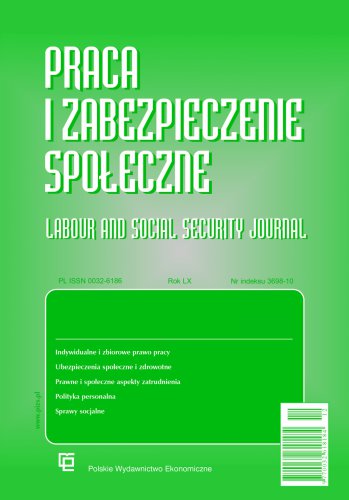The logic of algorithms in the world of work of the technological age: New possibilities and new limitations
The employer's managerial powers arising from labour law are not the same in nature as those shaped by technology, they locate the employer's managerial action in a very different area from technology — in interpersonal relationships and not in data, in instructions and not in signals, in relating to individuals' ways of being and not to feedback, to their conscientiousness and diligence and not to setting them up for exploitation. Technological leadership has a different means of expression, a different methodology of action, a different scale of coercion and order, is secured differently, and does not know the limits that are placed on normative leadership. Technology allows for a change in the paradigm of management, thanks to access to what was, which connects with what is, in order to determine what will be (feedback mechanism), uncovers what was hitherto hidden in the sense of impossibility to extract it from the labour legislation — the continuity, the permanence of supervision and the possibility of freely positioning the individual as a disposable asset. Technology is a new manifestation of management and, more fundamentally, a new manifestation of reference to human beings and to work; it has led to a hitherto unnoticed transgression of the limits of subjectivity, and thus of what is embedded in the object of regulation, in law, in personal dignity, and to an entry into the area of the possibility of freely objectifying the individual. This article attempts to capture the phenomenon of technological being-in-the-world and the resulting implications for labour law.
References
Bibliografia/References
Bąba, M. (2022). Podporządkowanie technologiczne w zatrudnieniu. Państwo i Prawo, (2).
Borkowski, P. (2007). Godność osoby ludzkiej — zasadą zasad społecznych. W A. Bałabucha (Red.). Jan Paweł II Promotorem godności człowieka. Świdnica.
Bosek, L. (2016). Uwagi do art. 30. W: M. Safjan, & L. Bosek, Konstytucja RP. Komentarz. Tom I. C.H.Beck.
Foucault, M. (1998). Trzeba bronić społeczeństwa. Wykłady z College de France, 1976 (M. Kowalska, Tłum.). Wydawnictwo KR.
Gutorow, J. (2001). Na kresach człowieka. Sześć esejów o dekonstrukcji. Wydawnictwo Uniwersytetu Opolskiego.
Heidegger, M. (1977a). Budować, mieszkać, myśleć. Eseje wybrane. Czytelnik.
Heidegger, M. (1977b). Uber den Humanismus. Vittorio Klostermann.
Heidegger, M. (1995). List o humanizmie (J. Tischner, Tłum.). W M. Heidegger, Znaki drogi. Aletheia.
Heidegger, M. (2002). Pytanie o technikę (J. Mizera, Tłum.). Kraków.
Heidegger, M. (2007). Odczyty i rozprawy. Aletheia.
Kogge, W. (2010). Heidegger, Dreyfus i pytanie o etykę tego, co techniczne. Fenomenologia, (8).
Kuczyński, T. (2008). W H. Szurgacz (Red.), Prawo pracy. Zarys wykładu. Difin.
Maślanka, T. (2004). Korzenie technicznego myślenia w filozofii Martina Heideggera. Państwo i Społeczeństwo, (1).
Modrzejewski, M. (2009). Systemy mrówkowe w zastosowaniu do rozwiązania problemu komiwojażera. Studia i Materiały Informatyki Stosowanej, I(1).
Mrozek, J. J. (2014). Godność osoby ludzkiej jako źródło praw człowieka i obywatela. Civitas et Lex, (1).
Parrika, J. (2010). Owady i media. Księgarnia Akademicka.
Piecuch, J. (1996–1997). Mistrz Heidegger. Principia, XVI–XVII.
Rozenberg, G., Baeck, T., & Kok, J. N. (2011). Handbook of natural computing. Springer Publishing Company.
Stiglitz, J. (2015). Cena nierówności. W jaki sposób dzisiejsze podziały społeczne zagrażają naszej przyszłości. Wydawnictwo Krytyki Politycznej.
Urban, J. (2004). Co Martinn Heidegger rozumie pod pojęciem ,,technika”? Na ile jest ona poddana roszczeniu zasady, że wszystko ma swoją przyczynę? Studia Redemptorystowskie, (2).
Warzyński, S. (2019). Współczesne wyzwanie dla podmiotowości — w stronę człowieka nieokreślonego. Studia Philosophiae Christianae, (55).
Wiener, N. (1960). Cybernetyka i społeczeństwo, Książka i Wiedza.
Wilk, E. (2008). Technologia wobec nowoczesności. Na marginesie pytań Heidegger. Instytut Sztuk Audiowizualnych Uniwersytet Jagielloński. https://ruj.uj.edu.pl/xmlui/bitstream/handle/item/87422/wilk_technologia_wobec_nowoczesnosci_2008.pdf?sequence=1&isAllowed=y
Wojtyła, K. (2003). Rozważania o istocie człowieka. Kraków.
Zielinski, S. (2006). Deep Time of the Media. Toward an Archaeology of Hearing and Seeing by Technical Means. Cambridge. MA: MIT Press.
Zieliński, S. (2019). Rozumienie godności człowieka i jej znaczenie w procesie stanowienia i stosowania prawa. Propozycja testu zgodności regulacji prawnych z zasadą godności człowieka. Przegląd Sejmowy, (4).

